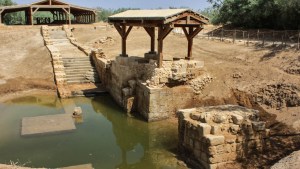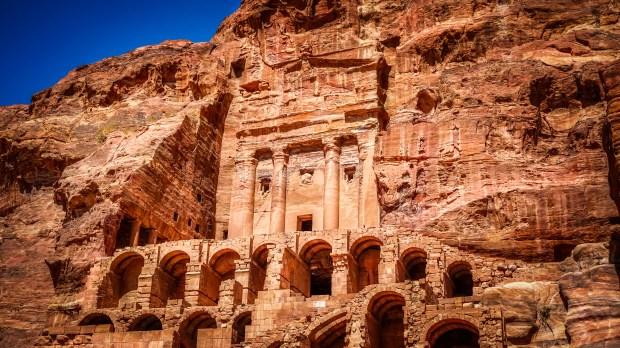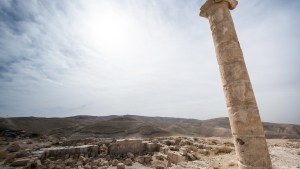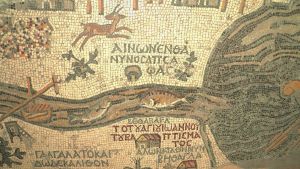Lenten Campaign 2025
This content is free of charge, as are all our articles.
Support us with a donation that is tax-deductible and enable us to continue to reach millions of readers.
Judaism, Christianity, and Islam are all Abrahamic religions. Needless to say, these traditions understand the figure of Abraham quite differently, and alternative perspectives on the first patriarch are also found within these traditions themselves depending on time and place. But, all differences considered, these religions do see in Abraham a common father, and a model for all believers. In that sense, they all form one single Abrahamic family.
Hospitality is a thoroughly Abrahamic value, right at the core of Scripture. Some read the very beginning of the book of Genesis as the ultimate gesture of hospitality, God creating a whole world for human beings to live in, tending to their every need. Genesis 18 somehow echoes this gesture, yet on a human scale. It tells the story of Abraham and Sarah’s generous hospitality to three visitors who came to them by the oaks of Mamre.

Seminomadic life would often bring people from different families and regions into contact with one another, Canaan being part of a natural land bridge between Asia and Africa and, consequently, a popular trade route. In the absence of a formal industry of hospitality, people living in cities, villages, small towns, and even encampments had a social obligation to welcome strangers. The text reads:
The Lord appeared to Abraham near the great trees of Mamre while he was sitting at the entrance to his tent in the heat of the day. Abraham looked up and saw three men standing nearby. When he saw them, he hurried from the entrance of his tent to meet them and bowed low to the ground. He said, “If I have found favor in your eyes, my lord, do not pass your servant by. Let a little water be brought, and then you may all wash your feet and rest under this tree. Let me get you something to eat, so you can be refreshed and then go on your way—now that you have come to your servant.” “Very well,” they answered, “do as you say.” So Abraham hurried into the tent to Sarah. “Quick,” he said, “get three sheaths of the finest flour and knead it and bake some bread.” Then he ran to the herd and selected a choice, tender calf and gave it to a servant, who hurried to prepare it. He then brought some curds and milk and the calf that had been prepared, and set these before them. While they ate, he stood near them under a tree. “Where is your wife Sarah?” they asked him. “There, in the tent,” he said. Then one of them said, “I will surely return to you about this time next year, and Sarah your wife will have a son.”
Tradition understands this passage to mean (among many other things) that were it not for their hospitality, Abraham and Sarah would have never had any children. It is only because they receive these strangers in their house that they also receive the blessing of having Isaac. They mirrored God’s initial, hospitable, literally creative gesture.
Jordanian hospitality
In Jordan, biblical references come alive, the generous Abrahamic hospitality being one of the main traces of the Jordanian character. This is especially true in Christmas time.
Christmas in Jordan is celebrated all across the country — from the ancient ruins of Gadara, in the north, to the pristine shores of Aqaba, in the south. The Jordanian Constitution clearly and explicitly provides its citizens with complete freedom to practice their own religion. Furthermore, Christmas is an official public holiday for everyone, the Jordanian holiday calendar being interfaith. That way, traditions and holidays are oftentimes celebrated by all Jordanians, regardless of their religious affiliation. And while Christians make up approximately 10% of the overall population, shops and cafes are covered in lights and red and green decorations, and hotels and restaurants typically offer special lunches and dinners for those who decide to celebrate elsewhere but at home. Even those who are not religious also partake in Christmas celebrations from a more “secular” angle, enjoying fruits dipped in brandy, rum, or cognac — a particularly cherished tradition — and even hire a “Santa” to deliver gifts to their kids.
Christmas in Jordan
This might be surprising for those who are not familiar with Jordan. True, the Jordanian population is mainly Muslim. And, as such, they hold Jesus, Mary, and John the Baptist in high regard.A whole surah (that is, a chapter) of the Quran is entirely devoted to Maryam (Mary), and yet another one (Al Imram) includes the narrative of Jesus’ virgin birth, Annunciation and all. The Qur’anic text goes on to say that Mary, asking how she could conceive and have a child when no man had touched her, was answered by the angel that God can decree what He wills, and it shall come to pass. The text also says that, overcome by the pains of childbirth, Mary was miraculously provided with a stream of water running under her feet from which she could drink, and with a palm tree that she could shake so ripe dates would fall from it.
Jordan is home to some of the most sacred sites of Christianity — the baptism site in particular, by the shores of the Jordan river. In fact, Christians living in Jordan are one of the oldest Christian communities in the world, going all the way back to the very inception of Christianity itself, in the 1st century. Jordanians are not only aware of their historical past and traditions: they get to see it every single day of their lives, as the country is full of ancient Byzantine basilicas that are to be found almost anywhere.
Many of these churches are still in use, most of them being Greek Orthodox. But there are also Roman Catholic communities, Armenian Orthodox, Lutherans, and Presbyterians, among others. In Amman, the capital of the country, one can even find Latter-Day Saints churches. This 2,00-year-old uninterrupted Christian presence in the country has naturally led Jordanians, Christian or non-Christian, to peacefully and joyfully celebrate Christmas and other religious feasts together. Moreover, since Christians are a minority in the country, all Christian churches have agreed to celebrate Christmas together according to the Western calendar, the 25th of December. Easter, on the other hand, is celebrated according to the Orthodox, Eastern calendar. That way, all Christians, eastern and Western, get to celebrate all their feasts together, their Muslim neighbors coming to visit them for Christmas, sharing time, food, and presents, while setting an inspiring example for everyone.
This content has been brought to you in partnership with the Jordan Tourism Board.




